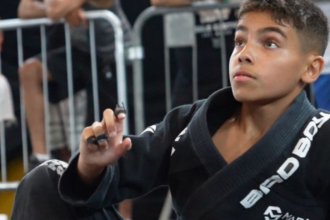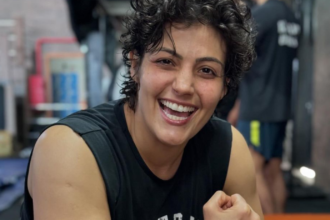Karol Meyer , icon of freediving in Brazil and beyond its borders, saw the light of the world in Recife (PE) on October 19, 1968, but her trajectory took her to live in Florianópolis/SC since childhood. There, she balanced her life between work at Caixa Econômica Federal, family, diving instruction, motivational talks and her passion for freediving.
From his early years, Karol had a predilection for different sports and a strong connection with the sea. He grew up spending long hours fishing and exploring the shores with his father, sharing meaningful moments with the ocean.
The sea, adventure and sport became his great passions, culminating in countless achievements. Internationally recognized as one of the most complete athletes in the history of sport, in 2007, she unified all South American brands. Her daring spirit has led her to not only break records, but also explore the world’s most beautiful places by freediving.
Karol was a pioneer by touching the Shipwreck of the Corveta Ipiranga, descending the famous “Walls” of a submarine abyss in Fernando de Noronha/PE, diving in the stunning Lago Azul in Niquelândia – Goiás, and leading the ” Freedive Adventures ” in paradises such as Bonito, Fernando de Noronha, Ubatuba, Bonaire – Caribbean. His achievements have kept Brazil among the best in the world in sports for over 25 years, with records recorded in history. In addition to being an athlete, Karol plays different roles, from lectures to courses, always committed to preserving the oceans.
How did the movie “The Big Blue” influence your interest in competitive freediving?
It was exactly through the film that I discovered the sport in this version of records and competition. It was immediate passion.
What are the most memorable moments you shared with the sea during your childhood?
Diving and fishing with my father were hours at sea, we saw everything: shells, starfish, seahorses and lots of offshore fish.

What was the experience of being the first apnea diver to touch the Shipwreck of the Corveta Ipiranga?
It was sensational, a milestone to this day. The Corvette is divine… I got there with fins and without fins and it was, without a doubt, a dream come true. It took a lot of training, tactics and a super team for this achievement. 63 meters deep and lots of marine life.
In addition to records, you explored incredible locations in your freediving activities. Which of these locations was the most memorable for you and why?
Red Sea, because it was the stage for my first international victory and a historic moment in this sport because I set the first world record, it would be the same as if we compared it to a world Olympic record. In Egypt I saw fish and corals of many colors too!

Tell us more about ” Freedive Adventures ” that you take in paradisiacal locations. What do these tours offer participants?
In addition to including the freediving course , we went to points of observation of marine life, at this point we put all the learning into practice and carried out true “Free” diving .
How do you see Brazil’s role on the world freediving scene, especially considering its 25 years of contribution to the sport?
We are growing with several pool events and with this we get closer to the public and have greater visibility and support. We are on the path to growth.

In addition to acting as an athlete, you are involved in lectures and courses. Can you tell us about a specific project or topic that is especially important to you?
I created the Folego Online Course focusing on disseminating the importance of breathing for a healthy and vital life. I also created the Folego na Bike Lecture with important tips for performance in the sport through breathing exercises and apnea itself. For the business world, I have a super motivational talk “Folego nas Empresas” that addresses my story and parallel requirements for us to overcome limits and achieve results.
How does your passion for freediving relate to your concern and involvement in ocean preservation?
It is totally interconnected, the oceans are the lungs of the world, without the sea we cannot survive! Professor at the Oceanographic Institute of the University of São Paulo (USP), Frederico Brandini highlighted the important role of the oceans: “The sea algae are responsible for producing most of the oxygen consumed on the planet. “
Follow Karol Meyer on www.karolmeyer.com.br





